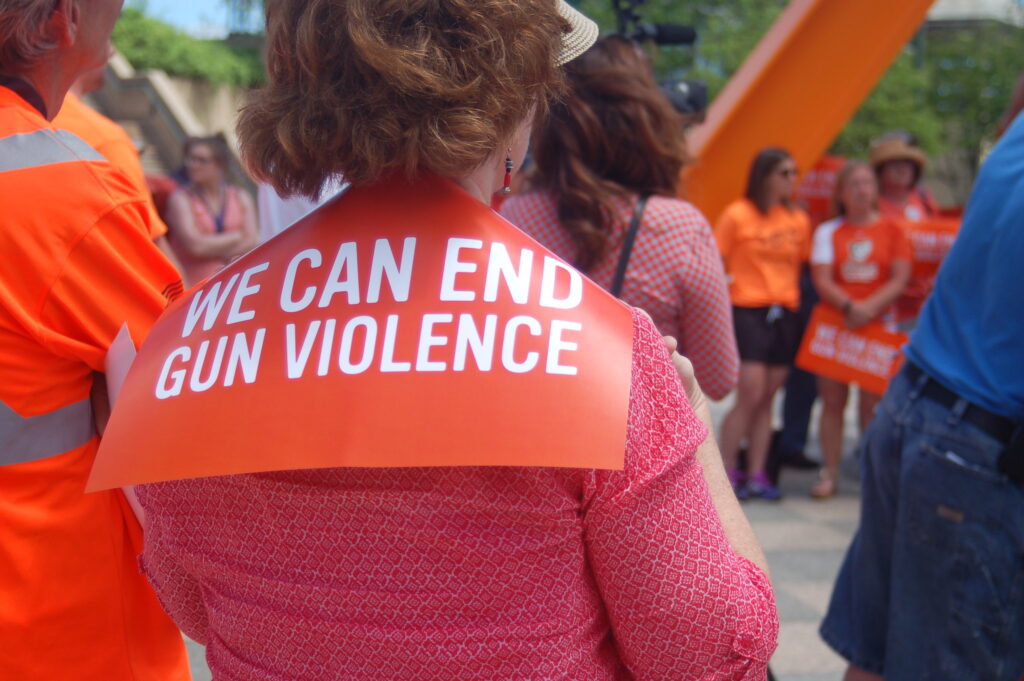Will Wisconsin Enact a Red Flag Gun Control Law?
The results of the recent election may not help.

Groups attend a gun control rally in downtown Milwaukee. Some lawmakers want to implement a red flag gun control measure in Wisconsin. (NNS file photo)
Attempts to implement a red flag gun control measure in Wisconsin have been rebuffed several times in recent years, but some legislators hope the results of last month’s election can change that.
“When the political dynamic shifts in the Legislature, we have a better shot at not only introducing the (red flag) legislation but giving it a fair public hearing,” said Dora Drake, current state representative and senator-elect. “The people of Wisconsin overwhelmingly support red flag laws.”
Red flag laws, also known as Extreme Risk Prevention Orders, allow judges to issue court orders to temporarily restrict access to guns by individuals who could pose a threat to themselves or others.
A red flag resolution was last introduced in Wisconsin in July 2023 but was shelved along with other resolutions in April.
In an interview before the election, Drake said she was hopeful that Democrats, who overwhelmingly support red flag laws, would assume a majority control in the Wisconsin Assembly.
That didn’t happen.
Instead, when the Wisconsin Legislature returns next month, Republicans will be in charge but have the narrowest majority since 2011, when they took control.
A push for stronger gun control laws
Drake said Wisconsin Republican lawmakers have not done enough when it comes to gun control measures. As a result, she said, people are at risk.
“As Democrats, we just want common sense laws on gun control, and that doesn’t mean we’re trying to take away someone’s Second Amendment rights,” she said. “People are tired of life being unnecessarily taken away.”
Jacob Taylor, communications director for Sen. LaTonya Johnson, said he thinks Gov. Tony Evers will once again include Extreme Risk Prevention Orders policy in his biennial budget proposal next year. If Republicans remove it, he said, it will be reintroduced by Johnson and other legislators.
Red flag “legislation will remain a priority for Senator Johnson and other Democrats committed to reducing gun violence in our state,” Taylor said.
Twenty-one other states, including neighboring states Illinois, Michigan and Minnesota, have already enacted red flag measures.
In March, the U.S. Department of Justice launched the National Extreme Risk Protection Order Resource Center, which provides training and technical assistance to law enforcement, judges, social service providers and others on how to implement red flag laws.
Gun laws don’t address core issues, opponents say
Nik Clark, founder and chairman of Wisconsin Carry Inc., a group that advocates for Second Amendment protections, said his organization is against red flag laws for a number of reasons.
Specifically, he doesn’t believe the laws will reduce crime.
“Ninety-five percent of crime is committed by people who are already felons and not even allowed to have a gun,” Clark said.
He said red flag laws and other gun control measures such as universal background checks are attempts by the government to weaken due processes for gun owners, making it easier for their weapons to be unlawfully seized.
He said taking away people’s rights to legally bear arms won’t make communities safer.
“If someone is willing to harm someone else, they don’t care about any laws,” Clark said. “We spend so much time on trying to prevent things, and we need to spend more time on preparedness to address them.”
What do Extreme Risk Protection Order laws do?
Nick Matuszewski is the director of policy and program at WAVE Educational Fund, Wisconsin’s oldest anti-violence advocacy group.
He said Extreme Risk Protection Order laws add a layer of protection for communities by improving the system in which a gun can be removed from people in crisis or are looking to harm themselves or others.
These laws “can be applied in cases where family members and other folks in the community are able to notice that there are dangers,” Matuszewski said.
He said red flag laws are known to reduce firearm suicides and can help prevent mass shootings.
“Unfortunately, there are too many folks in the state legislature . . . beholden to the gun lobby and are unwilling to enact a gun policy that infringes upon that relationship,” Matuszewski said.
What happens next?
Now that the dust has mostly settled from Election Day and Republicans still control the Assembly and Senate, will anything change?
Drake said lawmakers need to work together to move the needle in the right direction when it comes to preventing gun violence.
“We’ve already experienced so much trauma in our own communities, but there are things we can do to be preventative and intervene before more lives are lost, like implementing red flag laws,” she said.
Will Wisconsin enact a red flag gun control law? The results of the recent election may not help. was originally published by the Milwaukee Neighborhood News Service.
If you think stories like this are important, become a member of Urban Milwaukee and help support real, independent journalism. Plus you get some cool added benefits.





















The news yesterday reported that death of the 27th victim of gun violence under the age of 18 which included one four year old. Let’s get laws that demand that hand guns in homes with children need to be secured and better laws so that police can go after those who supply guns to teenagers.
The gun lobbyists, activists, and 2nd Amendment shouters never offer any options on how to better manage keeping guns out of the hands of those that should not have them. Their only position is that felons commit crimes with illegally procured firearms, and therefore all law abiding citizens should just arm themselves to the teeth, lock and load, and play “wild west” if and when the time comes.
This approach solves nothing. Not now. Not ever. It is far past the time to enact strict laws on how guns can be bought, who can buy them, establishing strict background checks and mandatory firearm safety courses, including laws that demand guns be stored safely by their owners.
We don’t live in the 1700’s anymore, when the 2nd Amendment referred to firearms that were single-shot weapons that took forever to reload and were often terribly inaccurate in hitting their targets. It’s time to address these facts, and not just continually vomit 250 year old excuses as to why we cannot reasonably find ways to make gun ownership and use safer.